Benzoin tincture transforms your natural perfumes in five powerful ways. You'll enhance longevity by stabilizing volatile top notes, especially in citrus-based blends. It adds a rich, warm undertone while harmoniously connecting different fragrance layers. You can create sophisticated oriental compositions by pairing it with spices and woods. When used at 5-20% concentration in alcohol-based formulations, it rounds off sharp edges and deepens complexity. Discover how this aromatic resin can elevate your perfume-making journey.
The Art of Anchoring Top Notes With Benzoin
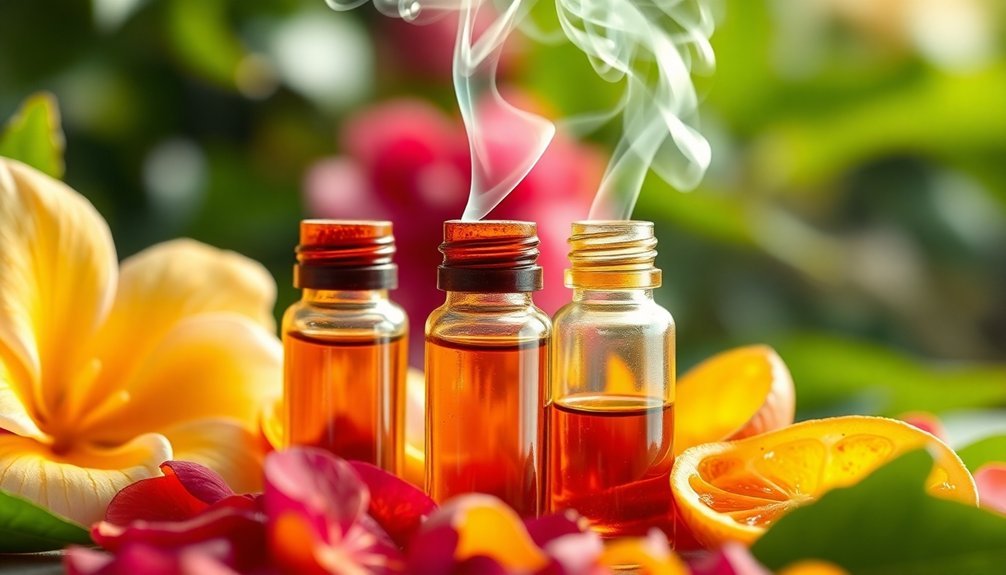
Perfumers consider benzoin tincture a masterful tool for anchoring volatile top notes in natural fragrances. When you're crafting your perfume, benzoin acts as a reliable fixative that prevents your carefully selected top notes from evaporating too quickly.
You'll find it particularly effective at stabilizing citrus oils like bergamot and lemon, creating a more lasting impression. The ethanol-diluted solution makes it ideal for alcohol-based perfumes while being incompatible with oil-based formulations.
To achieve the best results, you'll want to incorporate benzoin at 5-20% of your fragrance concentrate. This percentage guarantees you'll get the fixative benefits without overwhelming your composition.
As you blend, you'll notice how benzoin's warm, vanilla-like qualities help round off sharper notes while extending their presence. It's especially useful when you're working with lighter florals or citrus elements that need extra staying power in your natural perfume formulations.
Creating Longer-Lasting Natural Fragrances
Building upon benzoin's anchoring abilities, you'll discover several proven techniques for creating natural fragrances that last throughout the day.
When you blend benzoin tincture into your formulations at 5-20% concentration, you're revealing its powerful fixative properties that stabilize volatile components and slow their evaporation. The key lies in benzoin's heavy molecular weight, which helps your fragrance mature beautifully over time while adding a rich, warm undertone to your composition. Sourced from Southeast Asian trees, aromatic resin extracts provide the foundation for these long-lasting fragrances.
- Store your benzoin tincture in a cool, dark place to maintain its aromatic strength
- Test different concentrations to find the sweet spot that doesn't overpower other notes
- Blend with complementary scents like rose, jasmine, or sandalwood for complex profiles
- Age your tincture-based perfumes for several weeks to develop fuller, more refined notes
Blending Benzoin: Perfect Perfume Pairings
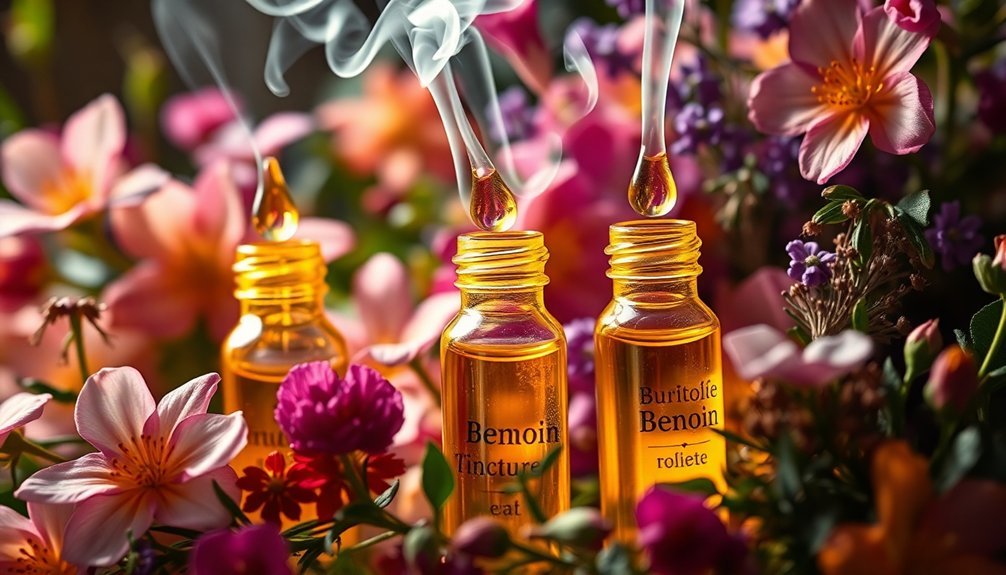
Four essential fragrance families pair exceptionally well with benzoin tincture, offering you endless possibilities for creating enchanting natural perfumes.
When you blend benzoin with citrus oils like bergamot, orange, or lemon, you'll create uplifting and balanced scents that enhance freshness. The sweet warmth of Siam benzoin perfectly complements citrus notes to create an exquisite harmony.
Adding spices such as cinnamon, clove, and nutmeg boosts the balsamic character while bringing warmth to your compositions.
You can deepen your fragrance by combining benzoin with other resins like labdanum and frankincense, creating rich, incense-like notes.
For complexity and longevity, try pairing benzoin with woody notes such as sandalwood, cedarwood, or patchouli.
It also works beautifully with florals like jasmine, rose, and orchid, making it perfect for oriental and amber fragrances.
Mastering Base Note Proportions
When creating natural perfumes with benzoin tincture, understanding proper base note proportions is essential for achieving a balanced and long-lasting fragrance.
You'll want to follow the general guideline of 25% base notes, with benzoin typically making up 5-20% of your fragrance concentrate. For oriental and woody perfumes, you can push benzoin to the higher end of this range, especially when crafting rich, vanilla-like undertones.
- Start with small percentages (around 5%) and gradually increase to find your perfect balance.
- Keep total base notes at about 25% of your formula, adjusting other components accordingly.
- Use higher concentrations (up to 15%) for balsamic vanilla perfumes.
- Remember benzoin works only in alcohol-based formulations, not fixed oils.
Transforming Simple Blends Into Complex Aromas
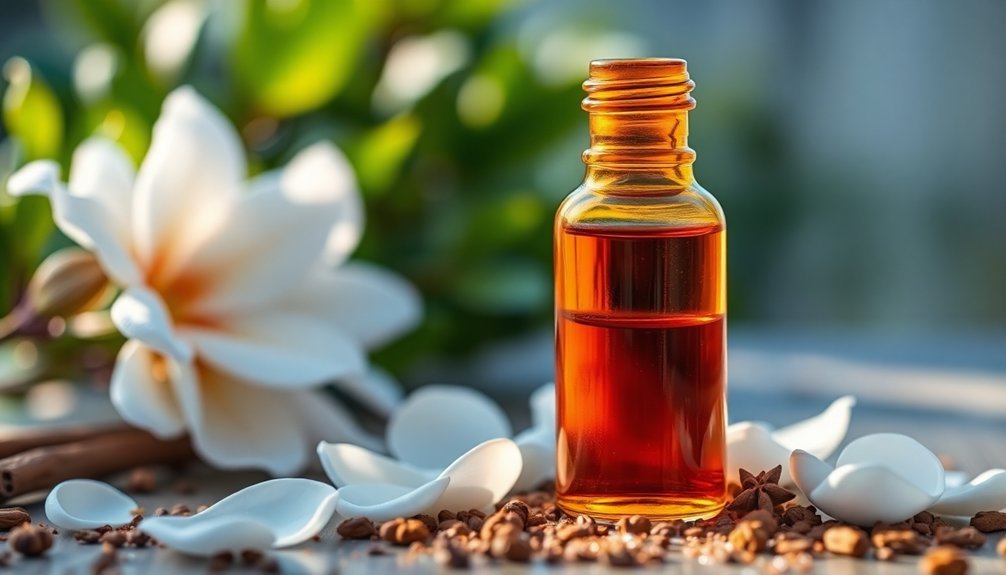
To transform simple blends into complex aromas, benzoin tincture serves as a masterful link between basic and sophisticated fragrances.
You'll find it enriches your blends with its warm, vanilla-like qualities while harmoniously connecting different fragrance layers.
When you add benzoin tincture to your natural perfumes, it'll enhance the interplay between floral, woody, and spicy components.
It's particularly effective in developing oriental and amber compositions, where it adds mystical, incense-like depth.
You can use it to round off sharp edges in your formulations and create smooth connections between top, middle, and base notes.
The tincture's ability to anchor lighter notes while supporting other ingredients makes it invaluable for elevating simple blends into more sophisticated, engaging fragrances that maintain their complexity throughout their wear time.
Frequently Asked Questions
Can Benzoin Tincture Stain Clothes or Fabric?
Yes, you'll need to be careful as benzoin tincture will stain your clothes and fabrics permanently. It's a brown, sticky liquid that easily marks porous materials, so always use protective coverings during application.
How Long Can Homemade Benzoin Tincture Be Stored?
Your homemade benzoin tincture can last up to 24 months when you store it properly in a cool, dark place. If you keep it sealed and away from light, it might even last 5 years.
Is Benzoin Tincture Safe to Apply Directly to Skin?
While you can apply benzoin tincture to your skin, you'll need to do a patch test first. Be cautious as it may cause irritation. Stop using if you develop a rash or allergic reaction.
What's the Difference Between Benzoin Resin and Benzoin Tincture?
While benzoin resin is the raw, solid tree sap from Styrax trees, benzoin tincture is what you'll get when you dissolve that resin in alcohol. The tincture's a liquid solution, typically 10% resin.
Can Benzoin Tincture Be Used in Reed Diffusers?
While you can try using benzoin tincture in reed diffusers, it's not ideal. The thick, resinous nature may clog the reeds. If you want to attempt it, you'll need to dilute it considerably first.
In Summary
You'll discover benzoin tincture is more than just a sweet, vanilla-like base note – it's your secret weapon for creating sophisticated natural perfumes that last. Whether you're anchoring delicate florals or adding depth to citrus blends, this rich resin transforms simple formulas into complex masterpieces. Start experimenting with small amounts in your favorite combinations, and you'll reveal benzoin's full potential as a natural perfumer's essential ally.
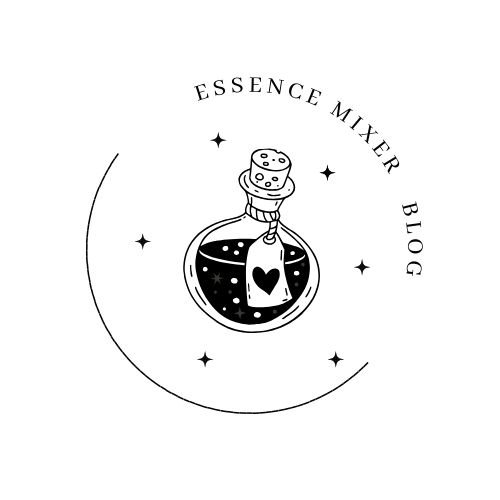
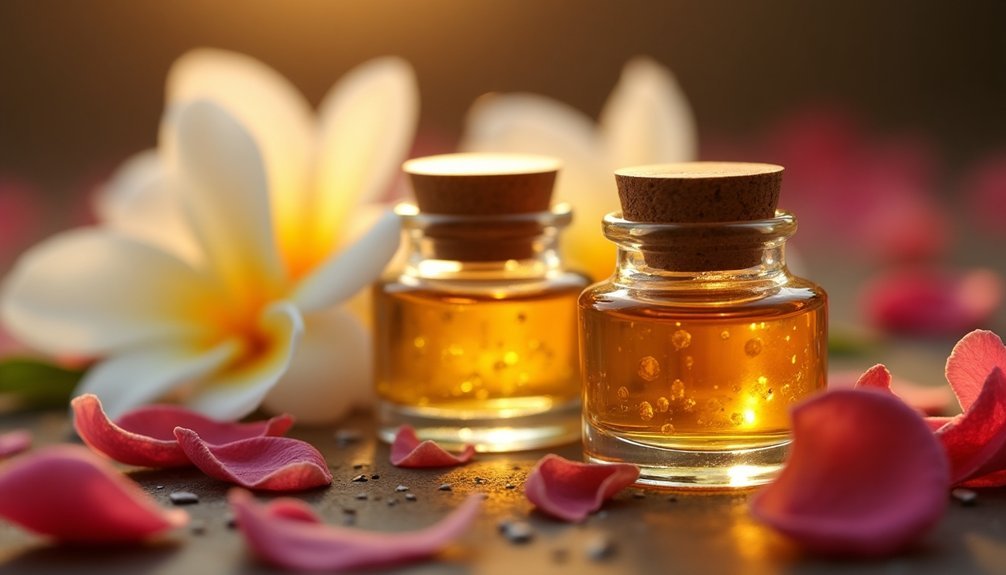



Leave a Reply